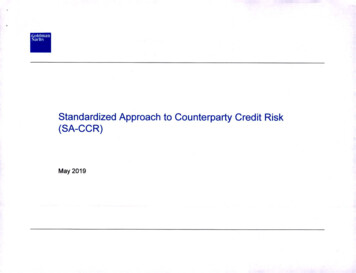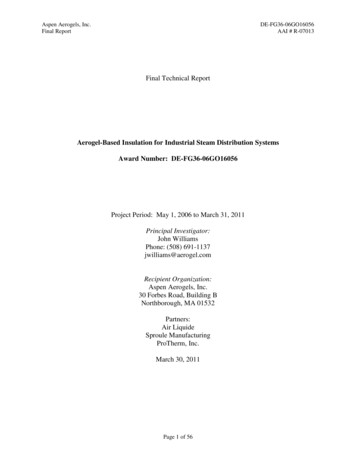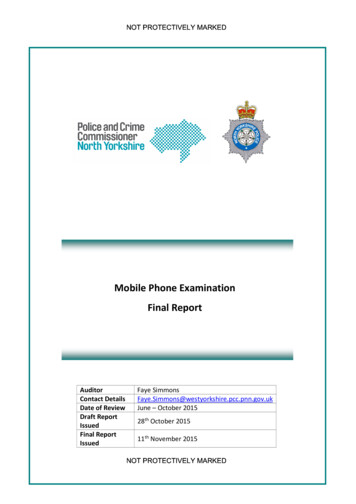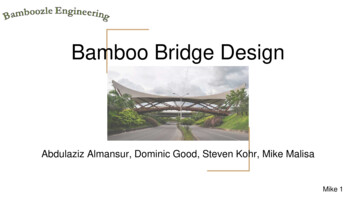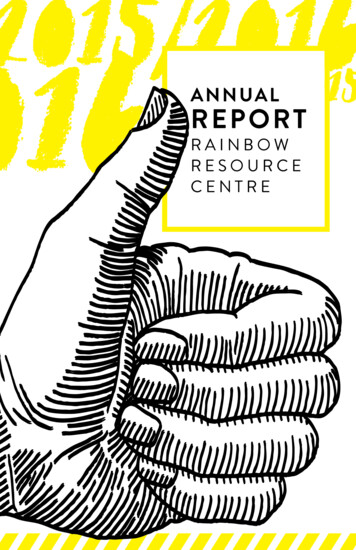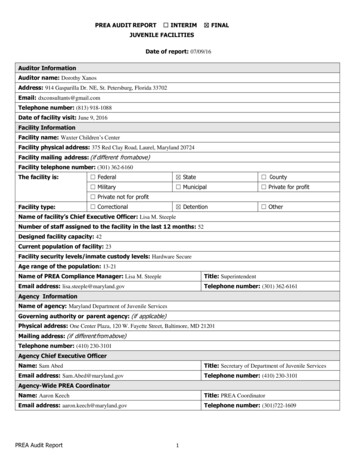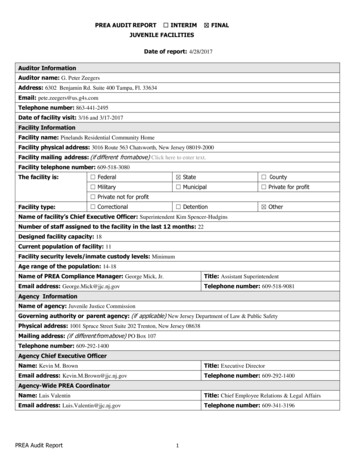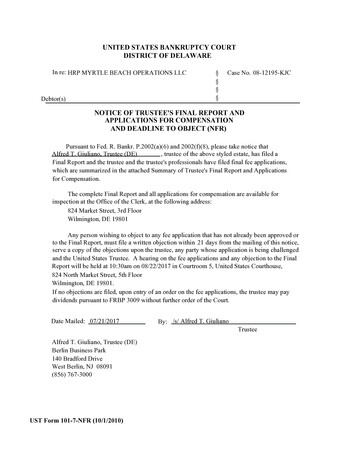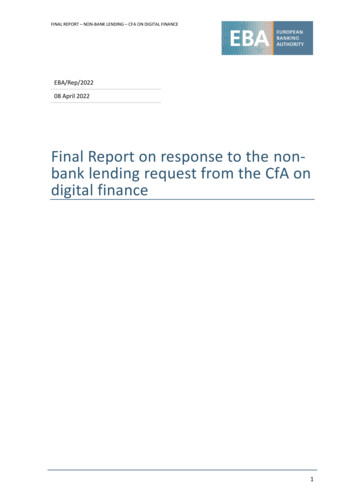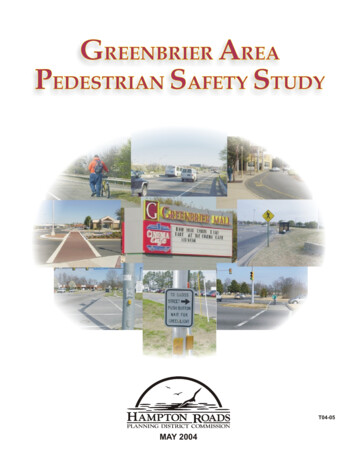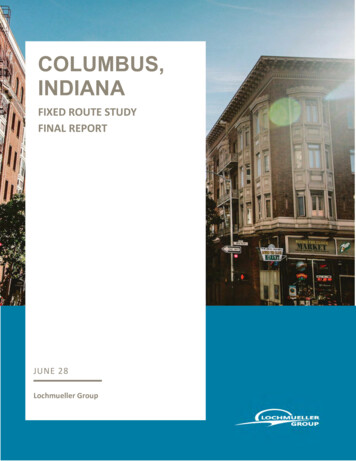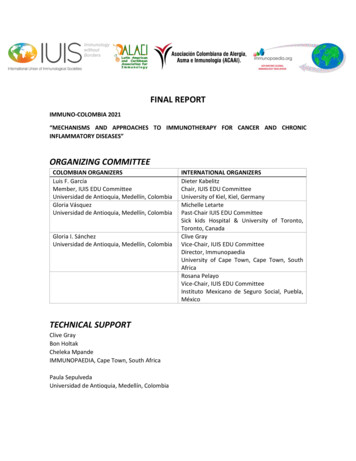
Transcription
FINAL REPORTIMMUNO-COLOMBIA 2021“MECHANISMS AND APPROACHES TO IMMUNOTHERAPY FOR CANCER AND CHRONICINFLAMMATORY DISEASES”ORGANIZING COMMITTEECOLOMBIAN ORGANIZERSLuis F. GarcíaMember, IUIS EDU CommitteeUniversidad de Antioquia, Medellín, ColombiaGloria VásquezUniversidad de Antioquia, Medellín, ColombiaGloria I. SánchezUniversidad de Antioquia, Medellín, ColombiaTECHNICAL SUPPORTClive GrayBon HoltakCheleka MpandeIMMUNOPAEDIA, Cape Town, South AfricaPaula SepulvedaUniversidad de Antioquia, Medellín, ColombiaINTERNATIONAL ORGANIZERSDieter KabelitzChair, IUIS EDU CommitteeUniversity of Kiel, Kiel, GermanyMichelle LetartePast-Chair IUIS EDU CommitteeSick kids Hospital & University of Toronto,Toronto, CanadaClive GrayVice-Chair, IUIS EDU CommitteeDirector, ImmunopaediaUniversity of Cape Town, Cape Town, SouthAfricaRosana PelayoVice-Chair, IUIS EDU CommitteeInstituto Mexicano de Seguro Social, Puebla,México
FACULTYAccording to the course content defined by the organizing committee, internationally recognizedimmunologists with experience in the area were invited to be part of the Faculty, provide reviewpapers and questions for the pre-course quizzes, present one lecture during the course, and Mentora group of students for the preparation of a research project. All invited scientists kindly acceptedthe invitation. Olivera Finn, University of Pittsburgh, Pittsburgh, USASonia Guedan, Hospital Clinic, Barcelona, SpainDieter Kabelitz, Christian-Albrechts University of Kiel, Kiel, GermanyAugusto Ochoa, Louisiana State University, New Orleans, USAKlaus Pantel, University Hospital, Hamburg, GermanyBetsy Quackenbush, SSI Consulting, New York, USACarla Rothlin, Yale School of Medicine, New Haven, CT, USAGloria Vásquez, Universidad de Antioquia, Medellín, ColombiaSoraya Zorro, Moffit Cancer Center, Tampa, FL, USAINTRODUCTIONDuring the last decade the understanding of many complex immune response phenomena has beentranslated into innovative therapeutic strategies, consolidating immunotherapy as an efficientapproach for the treatment of cancer, infectious, autoimmune, allergic, metabolic andcardiovascular diseases. However, most of these therapeutic tools are being continuously improvedand are subject to intense evaluation at the technological, experimental and clinical levels byresearchers, biotechnology industry and national and international regulatory agencies. Basicimmunologists working in academic and industrial institutions, engineers, clinical investigators ofdifferent specialties, epidemiologists and statisticians all participate in the development andexperimental/clinical evaluation of these immunotherapeutic products.These advances are the best examples of immunological translational research and pose newchallenges and opportunities for immunologists and clinicians to establish collaborations of mutualbenefit. There are still many immune phenomena that can become potential targets forimmunotherapeutic interventions in different diseases. Furthermore, development of newpredictive and diagnostic biomarkers for monitoring therapy efficacy and immune-related adverseevents is also needed and can be a great opportunity to promote basic-clinical networking.The aim of the present course was to gather immunology PhD students, postdocs and fellows inclinical specialties such as oncology, rheumatology, hematology and allergy among others, to discussthe immunological basis underlying the development of novel immunotherapeutic approaches. Thespecific aims were: To review the immunological mechanisms and molecules targeted by the newimmunotherapeutic strategies.To analyse the seminal research related to discovery and translation into clinical usefulproducts.
To review the clinical trials that demonstrate the efficacy of such treatments and theirlimitations.To understand the mechanisms of the immune-related adverse events occurring duringtreatment with these products.To get acquainted with the immunological monitoring procedures and biomarkers used forthe follow-up of patients treated with these products.To review the possibilities for the development of new immunotherapeutic agents, as wellas new potential applications.The initiative for this course was generated at the Universidad de Antioquia, Medellín, Colombia,and presented by Luis F. García at the IUIS-EDU Committee meeting in Beijing, China, the 20th ofOctober 2019 during the 17th IUIS-ICI Congress, where it was approved for the 2021 activities of theEDU-Committee. The course was planned as a traditional face-to-face course to be held nearMedellín in February 2021. Due to the COVID-19 pandemic, during the Virtual EDU-Committeemeeting on 23rd June 2020, it was decided to change it to an online course to take place during thefirst few months of 2021. Thereafter, the organizing Committee worked hard to design a high qualityscientific course, understanding that the online modality, rather than an obstacle, could be anopportunity for innovations which may be followed by future IUIS EDU-Committee courses.The call for the course was open in October 2020 to Latin American students; however, since thenumber of applications was small, the Organizing Committee decided to expand the call to studentsfrom Asia and Africa, and to extend the deadline until January 2021. Finally, 103 applicants from 26countries submitted their CV, a supporting letter from their advisors and a research abstract. TheOrganizing Committee carefully evaluated the applications, taking care of avoiding conflicts ofinterest, and selected 50 applicants from 19 countries to participate in the three stages of course(one accepted applicant from Egypt did not finish the pre-course and did not attend the course andtherefore, the attendees were 49 from 18 countries). Women represented 65.3% of the totalparticipation.Number of applications and selections by countryApplicationsTotal 10321 Argentina16 Mexico6 Algeria6 Brazil6 Tunisia5 Ghana5 India5 Morocco4 Colombia4 Kenya4 Nigeria3 Benin2 Cameroun2 Chile2 Ethiopia2 Senegal1 China1 Cuba1 Egypt1 Iran1 Japan1 Rwanda1 Sudan1 Tanzania1 Togo1 UgandaSelectedTotal 4913 Argentina9 Mexico4 Tunisia3 Colombia3 Morocco2 Algeria2 Brazil2 Ghana2 India1 Nigeria1 Cameroun1 Chile1 Senegal1 China1 Cuba1 Japan1 Tanzania1 Uganda
Regarding IUIS Federations, as expected, nearly 60% of the students came from Latin America(ALACI), one third from Africa (FAIS) and 8% from Asia (FIMSA).Students according to IUIS Federations59.18% ALACI32.65% FAIS8.16% FIMSATotal 49The course was structured with three main sequential activities:1- Pre-course: the aim of this activity was to refresh or upgrade the students with thefundamentals of immunology and immunotherapy needed to benefit maximally from thecourse. For this purpose, over one month the students studied the review papers submittedby the Faculty and undertook weekly quizzes that evaluated their understanding of thetopic.2- Course: During two weeks (April 5-16) there were Monday-Friday morning lectures by theFaculty and each student presented an abstract related to their research.3- Research project: Groups of 5/6 students, under the Mentorship of one Faculty member,prepared a project based on a question proposed by the Mentor. These projects werepresented at a final session of the course on May 7th and the best two, selected by theFaculty, were given awards.PRE-COURSEFor this part of the course, the student received from IMMUNOPAEDIA their login and password toaccess the pre-course. First, the students reviewed the fundamentals of immunology and thenreviewed the papers provided by the Faculty (3 for each topic). During the whole month of March,they answered quizzes weekly, which evaluated their understanding of the topics to be coveredduring the forthcoming course. Quizzes were scored in a scale of 0-5. The table shows the numberand percentage of students (n 49) for each score in each topic of the more specialized eckPointsBlockade45(91.8)3(6.1)1(2.1)0Gammadelta (16.3)1(2.0)0
1000000001(2.0)*n (%)In all topics, 90% of the students answered correctly 4 or 5 questions. Together, these scores meanthat the students carefully studied the papers selected by the Faculty.COURSEThe central core of the course took place between April 5th and 16th, with Monday-Friday lecturesby the Faculty, followed by a very active discussion and questions by the students. Then on each dayfive students presented their abstracts and answered questions from the Faculty and their fellowstudents. On April 16th, after finishing the abstract presentations and the instructions for thepreparation of the research projects, there was a “virtual party” with all organizers, the Faculty andthe students in which a video of Medellín (kindly prepared for the course by the MedellínConvention Bureau) was presented. Then, students from different countries participated withsongs, dances, dresses and videos of their native countries. This was well appreciated and a niceway to conclude the course.The following are the lectures presented during this part of the course:April 5thCourse presentation, Dieter Kabelitz and Luis F. GarcíaAn introductory overview of immunotherapy, Carla RothlinApril 6thCheck-points blockade-based therapies, Betsy QuackenbushApril 7thPerspectives of gamma/delta T-cells for immunotherapy of Cancer, Dieter KabelitzApril 8thCART-T(NK), armored CARs TRUCK therapies, Sonia GuedanApril 9thAnti-cytokines therapies, Gloria VásquezApril 12thTIL-based therapies, Soraya ZorroApril 13thMDSC Promote Tumor Growth and Escape, Augusto OchoaApril 14thCancer vaccination, Olivera FinnApril 15thImmunological laboratory methods for patient’s follow-up, Klaus PantelApril 16thGuidelines for research project preparation, assignment of groups, topics and Mentors,Michelle Letarte and Rosana PelayoSome of the students enrolled in the course volunteered to write reports of lecture proceedingswhich were published on the Immunopaedia website (and detailed in Appendix 1):
Immuno-Colombia: Overview of immunotherapyImmuno-Colombia: Checkpoint Blockade-based Therapies (Part 1)Immuno-Colombia: Checkpoint Blockade-based Therapies (Part 2)Immuno-Colombia: Anti-cytokine therapies (Part 1)Immuno-Colombia: Anti-cytokine therapies (Part 2)Immuno-Colombia: Tumour infiltrating lymphocyte therapy (Part 1)Immuno-Colombia: Tumour infiltrating lymphocyte therapy (Part 2)Immuno-Colombia: MDSCs promote tumour growth and escapeImmuno-Colombia: Therapeutic cancer vaccinesCourse EvaluationsCourse Evaluations by the students were very positive. On a scale of 1-10, the students ranked 9.2the five questions related to the course, its methodology and the quality of the Faculty and theirpresentations.Students, do you think thatthe course covered the topic sufficiently?9.3the new online format was appropriate to achieve its goals?9.2the themes of the course were sufficiently addressed?9.4the selection of the faculty was appropriate?9.7the level of the presentations by the faculty was appropriate?9.6n 350246810Score SDTo the question: “Overall, do you think that this event has met your expectation and is worthrepeating? If yes - what would you like to see different next time? If no - list one reason”, thefollowing are some representative answers:“Yes, I loved meeting people from all over the world and getting to work with them and learna lot of new things that I'm sure I will apply in my professional career.”“It was amazing! I just hope next time can be presential.”“Yes, I would like to interact more with the Faculty in a later opportunity.”“Yes, I really like the course. It was very interesting, and I don't have any suggestion. It met allmy expectations and more.”“Yes, I think it was really helpful as an update of information and knowledge in the immunooncology field. I would repeat the 2 weeks panel of talks and discussion session. However, Idid not appreciate the pre-course since it was too basic for people already working on (andsome of us even teaching) immunology.”
“Yes, this course was a wonderful experience and I think it is worth repeating it. May be fornext time it would be interested if we could have more exercises regarding theoreticalcontents on each sub-topic. May be online games, or any other pedagogic strategies besidesmultiple-choice questions.”“Yes. The evaluation must be more democratic. Students should see the google drive used.”“Yes, of course. I liked all the presentations by the Faculty. Maybe, the next time, you couldtalk about new topics - nanomedicine and cancer immunotherapy.”RESEARCH PROJECT PREPARATION AND PRESENTATIONNine groups of 5-6 students/group were set up by ML and RP, taking care that each group includedstudents from different countries, diverse research background and gender equity, and assigned toa Faculty/Mentor who had previously defined a question to be developed in a research project. OnApril 16th, the Mentors met with their respective group to explain the significance of the researchquestion and give them instructions on how to approach it. The students decided how they wouldwork and meet virtually and possible future meetings with the Mentor. On May 7th, during the finalsession, all the groups had 10 min to present the Project, using the same template. Presentationswere followed by questions and comments by the Faculty. The following are the research projectsdeveloped by the students:1. Defining the role of conventional dendritic cell 1 (cDC1) in anti-tumor immunity. DanielaRomina Montagna, Rajesh Kumar Gupta, Karen Dayanna Alvarez-Diaz, Gerardo Corral-Ruiz,Jeremias Dutto, Mouna Khan. (Carla Rothlin, Mentor)2. Assess predictive markers for differentiating checkpoint inhibitor resistance patients fromcheckpoint inhibitor responsive patients. Sarai Gisel De León-Rodríguez, Salma Abdeljalil,Lucia Boffelli, Wilbert Mbuya, Xiao-Hua Luo. (Betsy Quackenbush, Mentor)3. Can the in vitro growth and effector function of human γδ T-cells be enhanced by STINGinnate receptor ligands? Jessica Mariel Sierra, Moulay Yassine Belghali, Cecilia Smith, CintiaKaufman, Ulrich Femoe Membe (Dieter Kabelitz, Mentor)4. How to prevent CAR-T cells from becoming dysfunctional? Isadora Ferraz-Semionatto, JuanCarlos Nuñez-Enriquez, Dennis Dogbey, Valeria Sandoval-Torres, Akiko Suzuki, MacarenaMamberto. (Sonia Guedan, Mentor)5. Knowing the importance of monocytes in the pathogenesis of lupus nephritis, design animmunotherapy for lupus kidney disease. Zeineb Zian, Gisela Maria Suarez-Formigo, ImaneZouane, Ichrak Bannour, Cinthia Olexen. (Gloria Vásquez, Mentor)6. How could TIL therapy be further enhanced to achieve specificity and resistance to theimmunosuppressive tumor microenvironment (while keeping a reasonablemanufacturing period)? Carlos Orozco, Sawsan Feki, David Rosso, Yuliana Andrea OsorioOsorno, Nadia Bannoud, Mariem Tira (Soraya Zorro, Mentor)
7. Develop a panel of tests based on MDSC that will identify patients at high risk fordeveloping severe COVID-19. Aldana Trotta, Rubí Esmeralda Romo-Rodríguez, IkramHammi, Anna Ritah Namuganga, Camila Agustina Bach. (Augusto Ochoa, Mentor)8. Improving a response to a cancer vaccine. Jesús Guzmán-Mendoza, Juan Manuel OrtizWilczyñski, Doudou Georges Massar Niang, Micaela Belén Quereda-Corso, Carla SanzochiFogolin, Uzochukwu Ukachukwu (Olivera Finn, Mentor)9. Design a blood test for early breast cancer detection using liquid biopsy markers.Mohamed El-Hadi Seninet, Jocelyn Carolina Perez-Lara, Imtiyaz Ahmad Bhat, Karen Toledo,Olga Liliana Guzmán. (Klaus Pantel, Mentor).The projects were scored by the Faculty, with the exception of their own Project, and the twohighest scoring groups were selected as winners. Project #4 won the first prize, and Project #8 thesecond prize. The first prize will award each student with US 1000 and the second with US 500,towards attending any IUIS scientific meeting within the next two years, or to contribute to visitinga foreign lab for a short stay.The students also evaluated this part of the course, particularly the role of the Mentors and theexperience of virtual meetings with fellows from all over the world to prepare a research project.Their answers were very positive, 9.5, for both aspects. Interestingly, the number of virtualmeetings done to prepare the Project had a great variation (3 to 13) amongst groups, with anaverage of 6 meetings/group within the 3-week period.The students opinion of the projectHow well the mentor explained the project and answered questions?9.5How well did your group work?9.6How well did the group sessions work?9.5How many sessions did you have?9.5Did you enjoy the session with the presentations by all groups and the judging?n 350246810 12 14Score SDAlthough a good number of students felt nervous presenting in English, all of them agreed that itwas a positive experience and that the Zoom platform was a very nice tool for these kinds ofacademic activities. Some illustrative comments to the question “Was the research project part ofthe course helpful to you as a young scientist? Please explain.”, are the following:“yes! I have never made a research proposal from scratch, so it was really cool getting todesign all the rationale, hypothesis, experimental methods, etc. It was a great exercise forme!”“It makes me been outside of my comfort zone, I learned a lot.”“Yes, it allows the deliberate thinking to solve a particular within a short pace of time.”
“Yes, it made me look for literature and possible technics I didn't know, so I acquired newbackground and I'm aware of new tools now.”“Yes, it encouraged me that my Mentor had taken the time to correct and guide us.”“Yes, because I learn how to do team work internationally, and learn from many mistakes tooas comparing my work to others. That make me improve my presentations and speech, andmy speed of work.”“It was very useful. I have never created a research project. It was so challenging because itwas a new topic and a very new and innovative approach. For me was amazing!”“Definitely. Our Mentor really discussed the ideas for the project, and we were also able toask about possibilities to apply some of the ideas in our own projects.”“I really like the activity, and I think that this type of activity is quite helpful to train ourselvesin how to face a project in a collaborative way. Although we had some problems as a group,and not all the people were really committed to the assigned work, I learned many things.And our tutor was very predisposed to help us.”“Yes! The experience of working with colleagues from other countries and all thebrainstorming we did was an amazing and life changing opportunity. Even online, I feel reallyhonored to work with my group, everyone was really great, and I feel like we came up withan excellent Project.”“Very helpful. I learned a lot from the team. They stimulate me to learn.”“Yes. I learned about various treatment options on the subject. Promoted a scientific andfriendly relationship with the group members.”“Yes, we have learned how to build a project as a team. Also, we learned how to share ourideas, to discuss them and to decide together. On other hand, since each member of the teamhave specific skills, we all have learned from one and others.”“yes, it was a great idea because it makes me revisit the recorded sessions, improve thebibliography and it allows me to network actively with students from other parts of theworld.”“Yes, Absolutely. It was an amazing experience. I met other scientists with excellent ideas,very enthusiastic, and brilliant. We discussed our different point of view and we put to proofour skills to write a project. We shared part of our cultures and this is extremely enriched.Thank you for the opportunity.”“Yes, especially the challenge of working in group with different people, and having tocommunicate with everyone, and to come up with a project together, all of this will certainlyhelp me in the future.”Together, all opinions emphasized the importance of networking, exchange ideas and cultures.Nowadays that science is an international enterprise, this kind of exercises for young scientists is ofcapital importance.
FACULTY EVALUATION OF THE COURSEFacultyHow did you find lecturing on Zoom?Were the guidelines and plans/programme for the meeting clear?Did you find the discussion with the students engaging enough?Was the organization of the research project effective?0246810Score (mean)Faculty evaluation shows that they positively valued the organization of the course and the role ofthe moderators. Their comments were very positive on the importance of these activities. Not allthe Faculty felt comfortable lecturing by zoom, which may explain why some of them did not findeasy to engage in the discussion with the students.GENERAL CONCLUSIONS AND RECOMMENDATIONS BY THE ORGANIZING COMMITTEE1- The theme of the course was timely and important. Understanding immunotherapy requiresa good knowledge of all basic immunological phenomena, as well the immunopathogenesisof the target diseases.2- The on-line modality of the course was a big organizational challenge; however, theOrganizing Committee thinks that it was a successful course both in its scientific aspects aswell in that it allowed to have students and Faculty from many countries, at very differenttimes of the day and latitudes; something unthinkable under other modalities.3- Science, and Immunology in particular, is an international Enterprise, thus for youngimmunologists to have the opportunity to interact with other young fellows working incountries with different cultures and languages, but with the same life expectancies inscience, is a lifetime fascinating experience, as expressed by most of them in theircomments.4- The pre-course is the activity that needs more attention. The students have different levelsof immunology background. For students with a good immunologic background it may notbe necessary to spend time in reviewing the basic modules of the pre-course. It could bethat by testing their knowledge in an exam or just assessing their qualifications, theapplicants could be stratified, and the organizers decide who must go through the basicmodules.5- Although the traditional face-to-face courses offer the possibility of personal interactionsamong students and Faculty, and to have, for example, hands on laboratory workshops, theon-line courses allow to meet students and Faculty from different countries that otherwisewould not have the possibility to know each other. Also, for the Faculty, many have verybusy agendas, it is easier to accept an invitation to an on-line course than to travel forseveral days to a faraway place.
6- The experience gathered by IMMUNOPAEDIA, giving the technical support in all phases ofthe course is invaluable, as demonstrated in the present course; and, for sure, this coursealso helped the IMMUNOPAEDIA team to further strengthen their contribution.7- On-line courses facilitate the participation of organizers from different countries andfederations, not only from the organizing country, adding knowledge and experience tothem.8- Last but not least, the cost of on-line courses is much less than traditional on-site courses.
Appendix 1: ReportsImmuno-Colombia: Overview of immunotherapyProfessor Rothlin began by giving a brief history of cancer immunotherapy, starting with thefirst documented description of the tumour immune infiltrate by Virchow in 1863. She thenhighlighted the discovery of Coley’s toxin, a combination of heat-killed streptococcal bacterium andSerratia marcescens, in 1898 that William Coley used to treat malignant tumours. However,immunotherapeutic use of Coley's toxin was discontinued due to limitations such as no standardisedprotocol for the production and administration of Coley‘s toxin, and induction of heterogeneousimmune responses that did not always lead to anti-tumour immunity. These keys factors and theidentification of immune cells over the last century have enabled the development of many cancerimmunotherapies that target specific immune cell functions.Dr Rothlin presented data showing that administration of anti-CTLA-4 in mice after injection of51 Blim-10 tumour cells induced a reduction of tumour size and was associated with robust tumourcontrol. This study illustrated that T cells are a potential target for anti-tumour therapy. Additionally,research led by Gordon Freeman and Tasuku Honjo showed the critical role of inhibition of PD-1 byits ligands, PDL1 and PDL2, results in the negative regulation of T cells responses in cancerimmunotherapy. However, the main inconvenience with using these T cell response inhibitors is thehigh heterogenicity in their ability to control tumour growth.Professor Rothlin also highlighted two limitations of the cancer immunotherapy involving T cellscheckpoint blockade: In cancers relatively responsive to T cell checkpoint blockade (Melanoma, renal, lung andbladder cancer), treatment is only effective in a subset of patients Some types of cancer, such as pancreatic, prostate or brain tumours, are unresponsive totreatment.Other immunotherapies currently being tested target dendritic cells and macrophages usingimmune checkpoint inhibitors such as TYRO3, AXL and MERTK. Professor Rothlin presented datafrom her research group that showed that tumour infiltrating macrophages in YUMM 1.7 (YaleUniversity Melanoma model) and MC38 (colorectal cancer) models express MERTK. She thendemonstrated that MERTK ablation significantly improved the survival of MC38 mice by limitingtumour growth but not of YUMM 1.7 mice. Differences in response rates between the two cancermodels were attributed to (i) the low level of inflammatory macrophages and (ii) lower proportionsof proliferating monocytes and Batf3 dendritic cells in the YUMM 1.7 murine model compared withthe MC38 model. Thus, demonstrating that anti-tumour immunotherapy based on MERTK inhibitionis not effective against all cancer types. These data further highlight one of the major limitations ofcurrent anti-tumour immunotherapies. She also provided evidence that demonstrated that CD8 Tcells are required for a successful anti-tumour response, while CD4 T cells are dispensable.Finally, Professor Rothlin presented research on the use of Sitravatinib (from MIRATItherapeutics), a pharmacological inhibitor of MERTK, alone or in combination with α-PD1 in theMC38 tumour murine model. She showed that Sitravatinib alone or in combination with α-PD1significantly improves survival in the MC38 tumour model.
Interested in a detailed introduction to cancer immunotherapy? Read advanced pre-coursematerial on Overview of Immunotherapy.Full lecture recording available at IUIS-ALACI-ACAAI Immuno-Colombia 2021 Lecture week1.Article by Ulrich Femoe MembeImmuno-Colombia: Checkpoint Blockade-based TherapiesImmunotherapy has revolutionised the treatment of oncologic malignancies. Immunecheckpoint inhibitors represent a new class of immunotherapy drugs. Professor ElizabethQuackenbush began her talk by introducing the importance of anti-cancer immune response inprotecting the host against primary tumour development or enhancing tumour escape. This processis tightly regulated by immune checkpoints, immune-cell molecules that function as inhibitors(“brakes”) of ongoing immune responses. Checkpoints are usually surface receptors that controleither the activation or the inhibition of immune responses. Checkpoint inhibitors that block thecheckpoints can restore the body’s anti-cancer mechanisms (e.g. anti-tumour T cells remainactivated). Approved checkpoint inhibitors have transformed the cancer treatment landscape andimproved the long-term outlook for many patients with late-stage metastatic cancer. But, becauseof resistance mechanisms, only 25% of patients have positive responses to checkpoint inhibitors.Dr Quackenbush then described the cancer immunity cycle leading to the accumulation ofimmune-stimulatory factors that can amplify and broaden T cell responses. This cycle is divided intoseven major steps (Figure 1), starting with the release of antigens from the cancer cell and endingwith the killing of cancer cells. Professor Quackenbush added that researchers should be aware thatT cells trafficking in the blood vessels (step 4) does not always reflect the reality in the tumour (step5). Thus, biomarkers based on immune profiling of blood cells and not the tumourmicroenvironment could lead you down the wrong rabbit hole.Each step of the cancer-immunity cycle requires the coordination of numerous factors, bothstimulatory and inhibitory in nature. Immune checkpoint proteins, such as CTLA-4, can inhibit thedevelopment of an active immune response by acting primarily at the level of T cell developmentand proliferation (step 3; Figure 1). We distinguish these from immune rheostat (“immunostat”)factors, such as PD-L1 (expressed by activated T cells), which can have an inhibitory function thatprimarily acts to modulate active immune responses in the tumour microenvironment (step 7).Blocking the binding of PD-L1 to PD-1 (Nivolumab and others) with an immune checkpoint inhibitor(anti-PD-L1 or anti-PD-1) allows the T cells to kill tumour cells.Dr Quackenbush then reported on the various checkpoint inhibitors currently used and indevelopment. She discussed the antibody protein targets, binding affinities and thepharmacokinetics measured in various tumour types. She also highlighted new developments andmethods to optimize delivery and efficacy in the field of checkpoint inhibitors, including nonfucosylation, pro-drug formations, bi-specific antibodies, and newer small molecules and peptidecheckpoint inhibitors to have better oral bioavailability, fewer immune-rel
COLOMBIAN ORGANIZERS INTERNATIONAL ORGANIZERS Luis F. García Member, IUIS EDU Committee Universidad de Antioquia, Medellín, Colombia Dieter Kabelitz Chair, IUIS EDU Committee University of Kiel, Kiel, Germany Gloria Vásquez Universidad de Antioquia, Medellín, Colombia Michelle Letarte Past-Chair IUIS EDU Committee Sick kids Hospital & University of Toronto, Toronto, Canada Gloria I .
